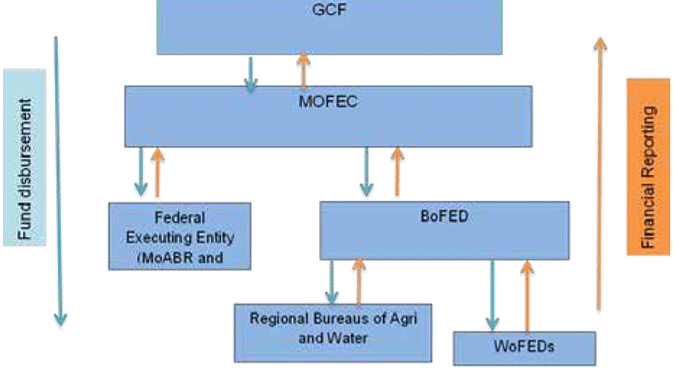Responding to Increasing Risk of Drought: Building Gender-Responsive Resilience in the Most Vulnerable Communities: FP058
Project Outline
This project seeks to increase the resilience of targeted rural communities to the adverse impacts of climate change by introducing new approaches to water supply and management systems, capable of increasing the productive capacity of the community and the carrying capacity of water ecosystems. The project will introduce proven technologies (solar-powered groundwater pumps and groundwater monitoring systems) and resilient infrastructure (boreholes and small-scale irrigation schemes), while utilizing natural resource management-based adaptation methods (physical and biological conservation).
| Country(ies) | Ethiopia |
|---|---|
| National Designated Authority (NDA) | Ministry of Environment, Forest and Climate Change (MEFCC) |
| Accredited Entity (AE) | Ministry of Finance and Economic Cooperation (MoFEC) (Direct/National) |
| Executing Entity (EE) | Ministry of Agriculture and Natural Resources (MoANR), and Ministry of Water, Irrigation and Electricity (MoWIE) (Public) |
| Date of Final FP Submission | |
| Estimated Project Duration | 2017-2022 |
| Target Sector | Water Resource Management/Agriculture |
| GCF Financing | 45 million USD (Grant) Small |
| Co-financing | Government of Ethiopia: 5 million USD (Grant) |
Project Description
< Major Project Components>
- Establishment of solar-powered groundwater pumping system, small scale irrigation, and water retention structures.
- Rehabilitation of degraded land surrounding water sources.
- Institutional strengthening, capacity building of communities and government staff, and facilitation of communication and learning.

Potential Indicators of Key Impacts
Expected total number of direct and indirect beneficiaries, disaggregated by gender (reduced vulnerability or increased resilience):
- Direct beneficiaries: 330,000 persons
- Indirect beneficiaries: 990,000 persons
0.4% (direct) and 1.5% (indirect) of the total population - Other relevant indicators:
- 1,320,000 persons benefiting from the use of climate information in decision-making.
- 66,000 households, of which 19,800 are female-headed, are estimated to be food-secure, have year-round access to a potable water supply, and use climate information in decision-making.
- 5,421 ha of irrigation land watered using low-emission energy.
- 7,850 ha of land rehabilitated, out of which trees planted on 5,000 ha of land.
- 264,000 households benefiting from climate-informed decision-making process.
- 264,000 households aware of the potential impacts of climate change and range of possible responses.
- 30% increase in the number of children enrolled in school.

